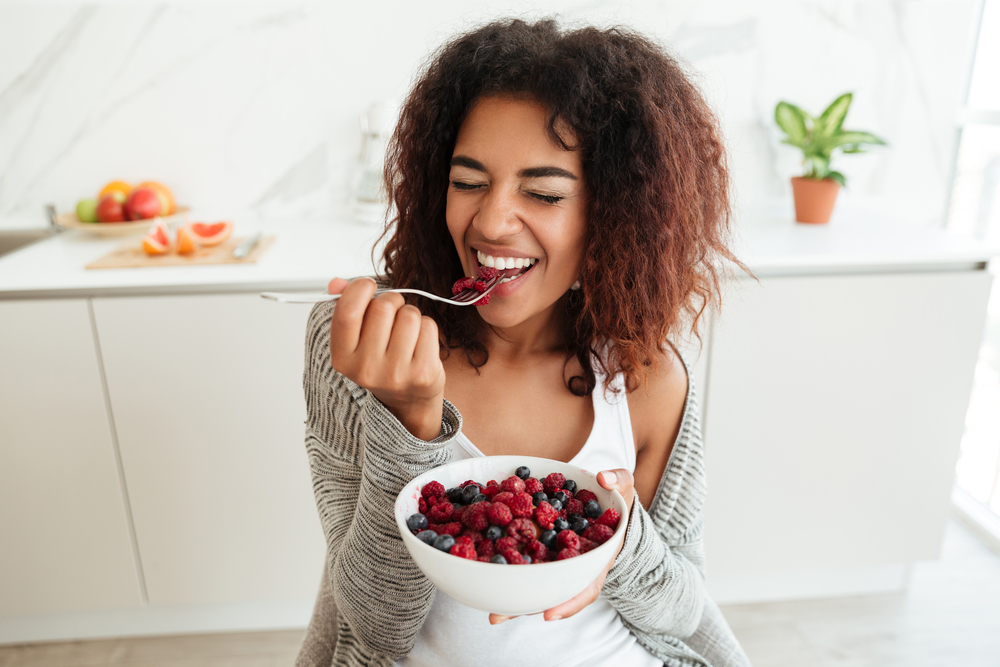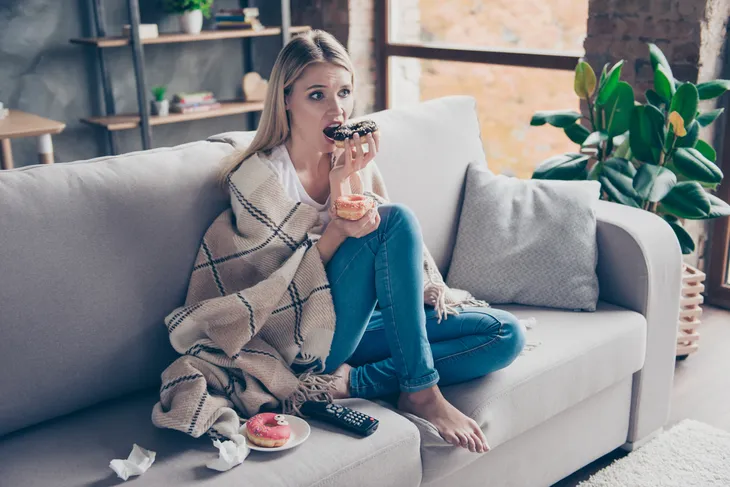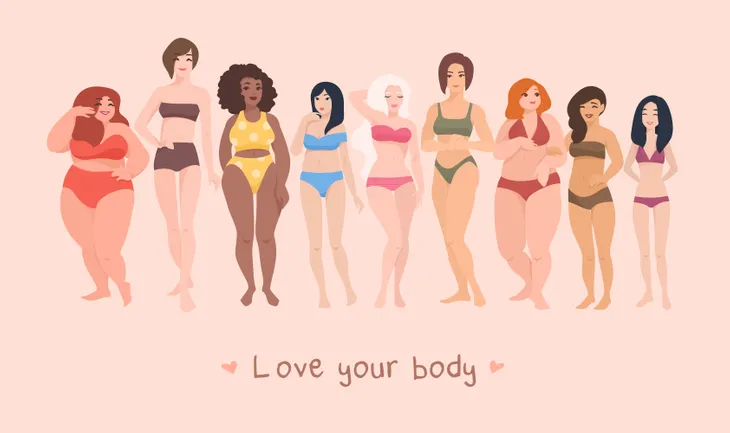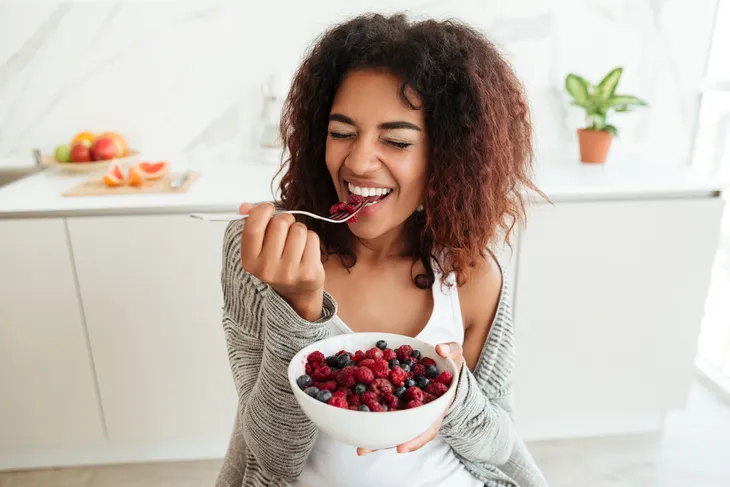American diets are often about obsessing about calorie and fat intake, and using a diary or app to keep track of it all. Intuitive eating is a sort of “mindful” way of nourishing yourself; it involves just eating when your body signals you to, and then stopping when you’re full.
This may sound ineffective to diet advocates, but the concept is that the body knows what it needs, and you will have cravings related to that need. So, as FannetasticFood.com points out, “Some days this certainly might be a kale salad with tons of veggies and lentils; another day, it might be a burger and fries.” Suppressing urges may result in binging later. Here are eight things to chew on about intuitive eating…
No Food is ‘Good’ or ‘Bad’
In the practice of intuitive eating, you learn to let go of “unhealthy” labels on everyday foods (like burger and fries), and in turn eventually lose the associated guilt that can be the anchor of a traditional diet.
As an article in the Huffington Post explains, it takes some time to train your mind and body not to be conscious of every calorie going into it. “It’s funny how once you realize you can actually have any food at any time, a lot of food’s irresistible draw vanishes,” notes the article.
Don’t Eat Your Emotions
Many Americans tend to eat how they feel. For example, they drown their sorrows in a pint of ice cream, or have a bucket of fried chicken when they need some comfort. However, intuitive eating aims to train you not to attach emotions to food.
IntuitiveEating.com challenges you to “honor your feelings without using food,” and invites you to find other ways to resolve your feelings (whether it’s anxiety or loneliness) that will deal more with the source rather than provide a temporary band-aid.
Accept Your Body Type
The same website says that not everyone is the same size and shape, and they’re not supposed to be. Wherever your natural weight hovers, that’s probably where it should be to be healthy. You do not have to lose 30-pounds or get ripped to respect yourself.
“Accept your genetic blueprint,” notes the site. It compares your body type with shoe size: someone with a size-8 foot will not fit into a size-6 shoe, and that’s just logic. “It’s hard to reject the diet mentality if you are unrealistic and overly critical about your body shape,” adds the source.
Learn to Savor Food Again
You may have been so wary of the foods you were putting into your body, that you stopped really enjoying them or just felt guilty through the entire meal when you indulged. However, eating is one of life’s great pleasures, so you shouldn’t have to feel bad about that or give it up.
The French eat decadent meals, and yet are still less obese and healthier on average than Americans, according to the source. The thinking behind this is focusing on quality over quantity when it comes to food. “They eat less, but savor and derive greater pleasure from their food. They taste instead of gorge,” notes the site.
Enjoy Company with Food
The Province also notes that the French can teach us even more about intuitive eating—that it’s as much about the company than the food itself. Portion sizes are smaller in France (compared to mega-sized American meals), but it may take you as long to eat it, because you’re socializing with friends and family.
Even with the often 2-hour lunches in France and other places in the world, people aren’t growing at the rate they are in America. While Americans sometimes only take 15-minutes for a quick bite, it can be something very greasy (and more importantly, eating quickly does not help proper digestion and can add unhealthy pounds).
A Side of Exercise is Usually Enough
IntuitiveEating.com notes that often with diets, a “militant” exercise regime becomes part of the routine. However, you don’t need to push your body to the max physically every day when you’re practicing intuitive eating.
“Just get active and feel the difference,” notes the site. Enjoy how it feels to be outside or to move your body, rather than counting off calories in your head for each step you take. Being active will help you feel naturally energized, which will help you continue to be active.
There are Reported Results
There are some sources that note some intuitive eaters lose weight for the first few weeks or months, but then start to lose their focus and end up putting more weight back on. However, credible sources say it helps them lose weight, including Dr.Steven Hawks, a professor of health science at Brigham Young University, who told CNN in 2006 that he lost 50-pounds through the practice.
Steven Hawks, speaking as a professor of health science at Brigham Young University, said he had great results with this “common sense” approach to eating. However, the article notes it takes a high degree of self-awareness to be successful, and that you can make healthy substitutes when you’re feeling a sugar craving (for example, fruit over a candy bar).
Mindful Eating May Aid Eating Disorder Recovery
According to EatingDisorderHope.com, we are all born intuitive eaters—as in, we eat when we’re hungry until we’re not hungry anymore. However, “What often perpetuates an eating disorder is the fear of simply not knowing how to eat,” notes the site. By focusing on removing negative thoughts about food and your body, this path may be helpful in recovery, it adds.
When you have an eating disorder, “food rules” have essentially taken over your psyche and begin to govern how you live, it notes, adding that outside influences on what you should eat are unnatural. It’s not an easy process, but dealing with underlying issues of the disorder can help one reconnect with intuitive eating and improve their relationship with food.











